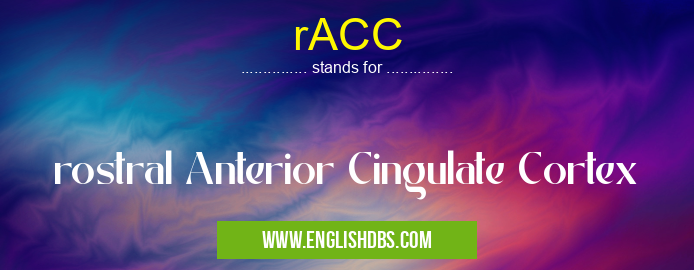What does RACC mean in PHYSIOLOGY
Abbreviations are forms of shortened words and phrases used to represent a particular concept. The medical field often uses abbreviations, like rACC, in order to succinctly convey complicated concepts and terminology without making long explanations. In this article, we will look at the meaning of rACC and what it stands for in a medical context.

rACC meaning in Physiology in Medical
rACC mostly used in an acronym Physiology in Category Medical that means rostral Anterior Cingulate Cortex
Shorthand: rACC,
Full Form: rostral Anterior Cingulate Cortex
For more information of "rostral Anterior Cingulate Cortex", see the section below.
» Medical » Physiology
Essential Questions and Answers on rostral Anterior Cingulate Cortex in "MEDICAL»PHYSIOLOGY"
What is rostral anterior cingulate cortex (rACC)?
The rostral anterior cingulate cortex (rACC) is a part of the brain responsible for higher cognitive processes such as decision making, emotion, and self-control. It is located in the medial frontal lobe of the cerebrum. It plays an important role in controlling both physical and mental processes, including regulating autonomic activity and cognitive functions related to memory, behavior, attention, language, and motor learning.
How does the rACC influence behavior?
The rACC has been linked to a range of behaviors related to decision making and self-control. Specifically, the rACC has been found to play a role in emotional regulation, inhibitory control over impulses or thoughts, attention shifting between tasks or situations, working memory performance, risk taking decisions and novelty preferences.
What are some conditions associated with dysfunctions in the rACC?
Dysfunction in this area of the brain can be associated with various disorders including major depression disorder (MDD), post-traumatic stress disorder (PTSD), obsessive compulsive disorder (OCD), Attention Deficit Hyperactivity Disorder (ADHD), autism spectrum disorder, panic disorder and generalized anxiety disorder.
Is there any research on improving functioning in this area of the brain?
There have been several studies exploring ways to improve functioning in this region through non-invasive techniques such as transcranial direct current stimulation (tDCS) or transcranial magnetic stimulation (TMS). In addition to being used to treat psychiatric disorders such as depression and OCD, these interventions are also being studied for their potential to enhance cognitive functions such as working memory or sequential processing speed.
Are there any risks involved with tDCS or TMS therapy?
While there have not been long-term studies on tDCS or TMS safety yet due to its relatively recent development as a technology, short-term studies generally show no negative side effects from these interventions when administered correctly by medical professionals who are properly trained in these treatments. Possible risks include seizures if too much electricity is applied during tDCS treatment; therefore it should only be done under medical supervision.
How does imaging technology help us understand rACC function?
Neuroscience tools such as functional Magnetic Resonance Imaging (fMRI) allow us to visualize activity in specific parts of the brain while someone is performing certain tasks or engaging in certain activities. This tool allows us to understand how different regions interact with each other—not just at rest—but while engaged in day-to-day activities which helps us better comprehend how they contribute to our behaviors and emotions. Studies utilizing fMRI have provided evidence for how different parts of the rostral anterior cingulate cortex are involved when we make decisions related to rewards versus punishments or when we focus our attention away from irrelevant stimuli.
Are their other imaging tools that can be used to study this area?
Yes! Diffusion Tensor Imaging (DTI) can measure structural connectivity between distinct regions within the brain by using water diffusion between them as an indicator for anatomical pathways connecting those areas together. This technique allows neuroscientists to better array out how information flows between different regions which could give insight into how dysfunction within specific areas of interest affect overall behavior and cognition.
Does psychological therapy modify rACC functioning?
Yes! Psychological therapies such as Cognitive Behavioral Therapy (CBT) have been found to modify activity levels within this region depending on how successful those therapies were at treating individuals’ respective clinical condition(s). In particular, research shows that patients who experienced greater reductions in symptoms after CBT showed increased activation within the rostral anterior cingulate cortex when compared with baseline measurements taken before their treatment sessions began [(citation)].
What is meant by “rostral” specifically referring to this region of cortex?
Rostral refers specifically here referring towards an anatomical position relative towards more dorsal/posterior portions of a structure located towards an organism's head end/section nearer towards where eyes would be situated [(citation)]. In other words - "rostral" meaning situated more forwardly than others - so relative towards anterior directionally speaking location wise from someone's point of view looking forwardly upon another individual's/organism's body frame features mentioned herein above..
Final Words:
In conclusion, rACC stands for Rostral Anterior Cingulate Cortex which is part of the cingulate cortex located just above the corpus callosum in the brain. Its primary function is regulating various cognitive functions such as decision-making and emotion processing by considering motivational factors when evaluating rewards or punishments from certain activities or decisions made by individuals. Dysfunction within this region has been linked to various behavioral difficulties including impulsivity and addictive behavior patterns due to altered reward responses or regulation over behavior associated with outcomes caused by malfunction of rACC.
rACC also stands for: |
|
| All stands for RACC |
